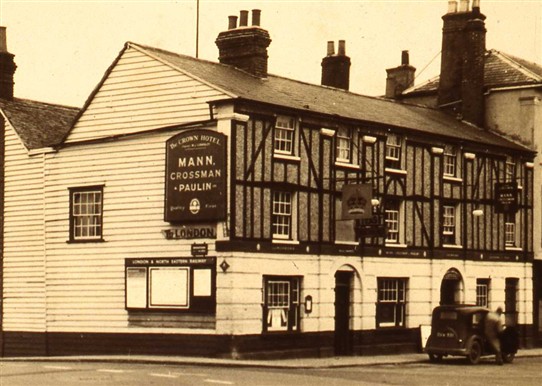Pubs and their Inmates - 2
The Crown, Rayleigh
Brian Pettitt
An extract from the memoirs of E.G. (Jim) Slatter called “Pubs and their Inmates.” Jim lived in Rayleigh in the 1940s.
'This time, I think we will take a trip into Essex which at the time was one of the few remaining places of open countryside near London. At the top of Crown Hill, Rayleigh stood “The Crown”, a large prosperous house which, during the years that followed whilst I lived in Essex, I used quite a lot, as they ran a social & sports club including cricket & football teams and the usual indoor pastimes. The landlord at the time, Stan Cooksley and his wife were a nice couple and popular with all the customers. Adjoining the pub itself was a brick built hall which was used for the weekly Saturday dances, which was also run by Stan & his wife. One Saturday evening two sons of a friend of mine were home on leave from the Navy and had found themselves two young girls as partners for the evening to enjoy the dance and a drink or two.
Stan never allowed drinks to be taken into the dance hall which meant of course you had to walk over and drink in the bar. I think this was done mostly so that he could keep an eye on the younger element. As the two boys were on leave with money to burn, the gin & tonics and scotch & dry gingers were heavy and fast and as it got later their trips to the bar became more frequent until none of them seemed to be able to negotiate the yard between the pub and hall, so finally they just stopped in the bar. When it got to closing time Stan had to wake one of them up and get a local car to run them all home. The following morning at opening time the two boys appeared – looking very sorry for themselves and still well under the weather and in a small voice called for two tomato juices with plenty of Worcester sauce. Stan served them and looked at the money on the counter, then turned away and took two envelopes from behind the till and handed one to each, whilst at the same time pushing back the cash on the counter. “Have these on me.” The boys looked at the envelopes and asked: “What’s this Stan?”

“Yours,” he replied. When they opened them there was just over £6 in each.
“That,” said Stan “is what you spent last night treating customers who knew you were both over the top so just said good health and let you think they had had a drink with you.
Also, when you came in here late in the evening and started the drinking bout I served you with plain tonic water and plain dry ginger and the four of you were so far gone you couldn’t tell the difference, so I took the money for the drinks and kept it for you so there you are.
The gratitude on their faces was wonderful to see as they turned to Stan and said: “Thank you guv’nor, you’re the whitest man we know.”.'